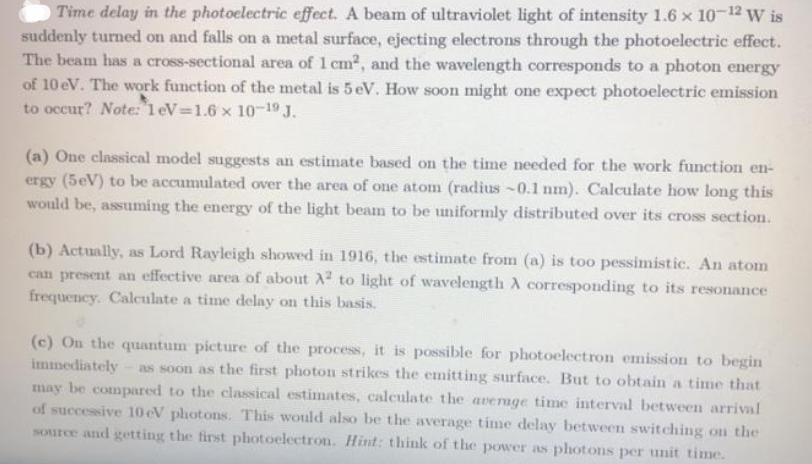Answered step by step
Verified Expert Solution
Question
1 Approved Answer
Time delay in the photoelectric effect. A beam of ultraviolet light of intensity 1.6 x 10-12 W is suddenly turned on and falls on

Time delay in the photoelectric effect. A beam of ultraviolet light of intensity 1.6 x 10-12 W is suddenly turned on and falls on a metal surface, ejecting electrons through the photoelectric effect. The beam has a cross-sectional area of 1 cm2, and the wavelength corresponds to a photon energy of 10 eV. The work function of the metal is 5 eV. How soon might one expect photoelectric emission to occur? Note: leV=1.6 x 10-19J. (a) One classical model suggests an estimate based on the time needed for the work function en- ergy (5eV) to be accumulated over the area of one atom (radius -0.1 nm). Calculate how long this would be, assuming the energy of the light beam to be uniformly distributed over its cross section. (b) Actually, as Lord Rayleigh showed in 1916, the estimate from (a) is too pessimistic. An atom can present an effective area of about A to light of wavelength A corresponding to its resonance frequency. Calculate a time delay on this basis. (c) On the quantum picture of the process, it is possible for photoelectron emission to begin immediately may be compared to the classical estimates, calculate the average time interval between arrival of successive 10 eV photons. This would also be the average time delay between switching on the source and getting the first photoelectron. Hint: think of the power as photons per uunit time. as soon as the first photon strikes the emitting surface. But to obtain a time that
Step by Step Solution
★★★★★
3.43 Rating (156 Votes )
There are 3 Steps involved in it
Step: 1

Get Instant Access to Expert-Tailored Solutions
See step-by-step solutions with expert insights and AI powered tools for academic success
Step: 2

Step: 3

Ace Your Homework with AI
Get the answers you need in no time with our AI-driven, step-by-step assistance
Get Started


